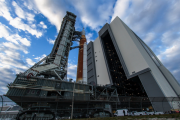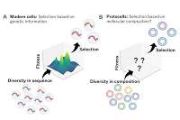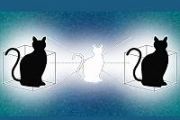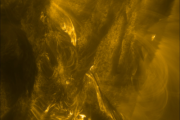
Copernical Team
Watch live: Living Planet Symposium 2022

The time has finally come for ESA’s Living Planet Symposium – one of the largest Earth observation conferences in the world. Follow our live streaming all week on ESA Web TV, starting with the Opening Ceremony on Monday 23 May at 09:00 (CEST).
Week in images: 16-20 May 2022

Week in images: 16-20 May 2022
Discover our week through the lens
Earth from Space: Bonn, Germany

ESA’s Living Planet Symposium – one of the largest Earth observation conferences in the world – is being held on 23–27 May in Bonn, Germany. Held every three years, the symposium brings together scientists and researchers, as well as industry and users of Earth observation data, from all over the world to present and discuss the latest findings on Earth science.
Meet the navigation team | Space jobs
 Video:
00:07:13
Video:
00:07:13
Dive into our navigation activities and hear about the projects, goals, challenges and work environment from ESA staff working in the Navigation Directorate and the Directorate for Technology, Engineering and Quality.
Find out more about Careers at ESA: https://careers.esa.int/
Massive eruption of Tongan volcano provides an explosion of data
 The Hunga volcano ushered in 2022 with a bang, devastating the island nation of Tonga and sending aid agencies, and Earth scientists, into a flurry of activity. It had been nearly 140 years since an eruption of this scale shook the Earth.
UC Santa Barbara's Robin Matoza led a team of 76 scientists, from 17 nations, to characterize the eruption's atmospheric waves, the strongest recorded fr
The Hunga volcano ushered in 2022 with a bang, devastating the island nation of Tonga and sending aid agencies, and Earth scientists, into a flurry of activity. It had been nearly 140 years since an eruption of this scale shook the Earth.
UC Santa Barbara's Robin Matoza led a team of 76 scientists, from 17 nations, to characterize the eruption's atmospheric waves, the strongest recorded fr 'Chariots of Fire' and 'Blade Runner' composer Vangelis dies aged 79
 "Blade Runner" and "Chariots of Fire" composer Vangelis, the Oscar-winning electronic music pioneer whose distinctive musical style defined a generation of film soundtracks, has died aged 79, Greece's prime minister said on Thursday.
According to several Greek media outlets, Vangelis died of the coronavirus in France where he lived part-time, as well as in London and Athens.
"Vangelis Pa
"Blade Runner" and "Chariots of Fire" composer Vangelis, the Oscar-winning electronic music pioneer whose distinctive musical style defined a generation of film soundtracks, has died aged 79, Greece's prime minister said on Thursday.
According to several Greek media outlets, Vangelis died of the coronavirus in France where he lived part-time, as well as in London and Athens.
"Vangelis Pa The search for how life on Earth transformed from simple to complex
 Once upon a time, all life on Earth was alien. But eventually, strange single-celled organisms thriving on a harsh planet gave way to complex, multicellular organisms made up of the basic building blocks we associate with life today, including carbon, oxygen and nitrogen.
Announced by NASA this week, a new collaboration of astrobiology researchers across the country working together under
Once upon a time, all life on Earth was alien. But eventually, strange single-celled organisms thriving on a harsh planet gave way to complex, multicellular organisms made up of the basic building blocks we associate with life today, including carbon, oxygen and nitrogen.
Announced by NASA this week, a new collaboration of astrobiology researchers across the country working together under Vandenberg Space Force Base celebrates first-year milestones
 A year after becoming part of the Department of Defense's newest branch, Vandenberg Space Force Base's community paused to celebrate May 11, 2022.
During a ceremony held at the base's Pacific Coast Club, both Col. Rob Long, commander, Space Launch Delta 30, and Chief Master Sgt. Jason DeLucy, command chief master sergeant, Space Launch Delta 30, showcased highlights from the past year.
A year after becoming part of the Department of Defense's newest branch, Vandenberg Space Force Base's community paused to celebrate May 11, 2022.
During a ceremony held at the base's Pacific Coast Club, both Col. Rob Long, commander, Space Launch Delta 30, and Chief Master Sgt. Jason DeLucy, command chief master sergeant, Space Launch Delta 30, showcased highlights from the past year. The future of desalination?
 Water scarcity is a growing problem around the world. Desalination of seawater is an established method to produce drinkable water but comes with huge energy costs. For the first time, researchers use fluorine-based nanostructures to successfully filter salt from water. Compared to current desalination methods, these fluorous nanochannels work faster, require less pressure and less energy, and a
Water scarcity is a growing problem around the world. Desalination of seawater is an established method to produce drinkable water but comes with huge energy costs. For the first time, researchers use fluorine-based nanostructures to successfully filter salt from water. Compared to current desalination methods, these fluorous nanochannels work faster, require less pressure and less energy, and a For plasma with a hot core and cool edges, Super-H mode shows promise
 Future fusion reactors have a conundrum: how to maintain a plasma core that is hotter than the surface of the sun without melting the device walls. Researchers call this challenge "core-edge integration." One method of cooling the plasma edge is to inject impurities such as nitrogen. The impurities absorb heat and release the energy as light that dissipates evenly across the walls.
New res
Future fusion reactors have a conundrum: how to maintain a plasma core that is hotter than the surface of the sun without melting the device walls. Researchers call this challenge "core-edge integration." One method of cooling the plasma edge is to inject impurities such as nitrogen. The impurities absorb heat and release the energy as light that dissipates evenly across the walls.
New res 






























